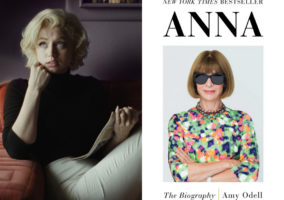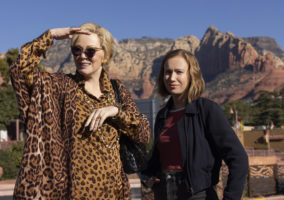We desperately wanted a chance to interview Deborah Lacey, who plays the Drapers’ maid Carla, before the season ended. It took a little longer because of some scheduling issues, but we finally got a chance to do so this week. We could have asked the AMC peeps for a chance to interview just about anyone in the cast, but we really wanted to shine a spotlight on her because there’s something about her quiet, dignified portrayal that riveted us and we were curious to hear her thoughts on the character, the times, and the show itself. She is very warm and interesting and easy to talk to and we had a wonderful conversation that went in all kinds of unplanned-for directions. It was honestly one of the most rewarding interviews we’ve ever done.
Part of the reason we wanted to talk to you specifically is because of your portrayal of Carla and how you do so much with the little that you’re given to work with.
Thank you. And it looks like people are getting what I’m trying to do with Carla.
We think so. Even though Carla got maybe two dozen lines all season, it always seems like the focus is pulled over to her in every scene she’s in.
Wow, thank you. That sounds good!
Now that we’ve buttered you up, what do you think of Carla? Who is she?
I see her as very dignified, probably has some kind of interest in education. She’s interested in politics in the world. She’s very 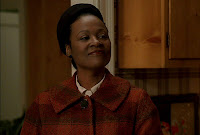 loving and caring. She has her own strengths. She’s definitely deserving of equality. She has a lot of sense. At least, that’s how I’m hoping I’m portraying her.
loving and caring. She has her own strengths. She’s definitely deserving of equality. She has a lot of sense. At least, that’s how I’m hoping I’m portraying her.
Were you given any background or information about Carla from the show’s writers or creators?
No.
Did you fill it in yourself?
I pretty much kind of made her a general type of character. No ideas where she comes from or what she does when she leaves the Draper house, but I have certain ideas in my heart about her and who she is when I’m playing her.
Does she have kids, in your mind?
I think she does. I don’t know that, but I think her loving spirit for these children comes from a loving place. I think she understands children; I think she understands raising children. I think that’s why she has patience with children. I think she has children of her own, yeah.
We think she understands marriage very well too. One of our favorite Carla scenes was from last season when she told Betty, “Splash a little cold water on your face and go outside.”
Exactly.
So what do you think Carla thinks of the Drapers’ marriage? She sees all of this drama play out and she never says anything.
I think it’s a human experience. I think she knows what they’re going through and I think she knows what married couples go through when they’re not faithful to each other and the marriage is not a priority. I think she respects both of them equally – and she respects her job – so she’s not going to get in the middle of anything. But I don’t think their marriage is the kind of marriage that she would have. There was some reference to her going to church every Sunday, so I think she has a more spiritual foundation where she respects 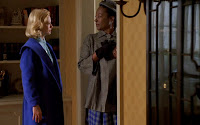 marriage more than what the Drapers are doing. So she pretty much stays silent and not involved.
marriage more than what the Drapers are doing. So she pretty much stays silent and not involved.
Do you think she, for lack of a better word, do you think she judges them? Because an awful lot of bad stuff played out right in front of Carla. How much of an opinion does she have about who’s right or wrong in that marriage?
Well, I think from a woman’s perspective, she may have a little more sympathy for Betty. I mean, that’s how I feel about it. When I reached out to her in that scene you were talking about, it was like a woman-to-woman type of thing. She offered her friendship to her from a woman’s point of view. I think she still respects who Don Draper is because he’s still paying the bills. I don’t think she has an opinion as to who’s right or wrong because she knows her place and she doesn’t want to get fired.
It’s interesting that you use the phrase “knows her place,” because that leads us to our next question. As an African-American actress in 2009, is it difficult to play a pre-civil rights maid?
You know, I get that question a lot and the answer is of course; of course it is. The reason why I can play Carla the way I do and give her the dignity that she has is because the set is so wonderful. The other actors treat me with all the respect and regard that they give to each other, so I never feel like I’m less than anybody else in my real life.
And also, my mother was a maid in the ‘60s. My mother was the maid for Bob Denver in the ‘60s. So in order for me to play her, I called my moth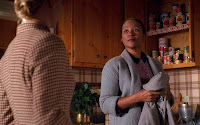 er and got a good sense of her relationship with Bob’s wife and how they loved each other. They were very good friends. I based Carla on that relationship in terms of being equal and open to a friendship and always knowing that there was a paycheck involved, and with the times involved there was a line that you just didn’t cross. So I had kind of a personal feeling about it and I wanted to be more than something stereotypical that other people might have seen. I just wanted her to be something different.
er and got a good sense of her relationship with Bob’s wife and how they loved each other. They were very good friends. I based Carla on that relationship in terms of being equal and open to a friendship and always knowing that there was a paycheck involved, and with the times involved there was a line that you just didn’t cross. So I had kind of a personal feeling about it and I wanted to be more than something stereotypical that other people might have seen. I just wanted her to be something different.
Has your mother seen your portrayal?
She’s seen it a couple times but she’s not really into television. She talks to me about it all the time because I’m always telling her when I’m on. But she doesn’t really appreciate television all that much. She’s older; she just turned 90 in June. So she’s a little bit into her own things, she knits and stuff, but we have conversations about Carla all the time. She likes that I’m playing Carla.
You have an awful lot of experience on television. How does Mad Men differ from those other shows?
Well, it’s a period thing, so that makes a difference, going back to that period. Becaus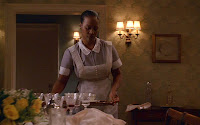 e they’ve researched it so much I really feel like I’m reliving that history. So that’s an opportunity that I never had before, feeling like I’m part of a real place.
e they’ve researched it so much I really feel like I’m reliving that history. So that’s an opportunity that I never had before, feeling like I’m part of a real place.
And there’s the costumes, which just add to that feeling of being in a different time. Most of the things I’ve done are current characters. I would say the biggest difference is adjusting to the different times and being that person in history. And the wardrobe helps with that. You know, they’re being very authentic to everything in this period.
Right down to the underwear?
[Laughs] Absolutely. Yep.
Do you feel a little left out that you don’t get to wear the fabulous clothes that the other women get to wear?
I feel very left out! And I’m telling you, Carla has another life! She lets her hair down and she’s probably singing at some club somewhere; a whole totally different persona.
Hopefully, we’ll get to see that next season.
Yeah! There’s got to be more of her. I think she’s an attractive woman. I think when she lets her hair down that she’s appealing. So I think there’s another life there. I would LOVE to do that. I have five older sisters who grew up in the sixties and I looked at a lot of their clothes and pictures and they had these beautiful flip hairdos with bangs. That’s how I see Carla.
Our favorite Carla moment this season was the moment when she found out JFK was dead. When she sat down on that couch and took that cigarette from Betty, she seemed very human and it felt like the barriers had dropped and just for that moment she wasn’t Betty’s employee.
Exactly. Well, thank you. That’s exactly what I was going for. The director was really good and very specific. His direction was, “You don’t care about anything; you don’t care about those kids; you just want to get in there and find out what’s going on.” So that’s what I did. Again, that was a moment when I could let people know who Carla is outside of this house. I had a hard time trying to light that cigarette and make it real because I don’t smoke and I’ve never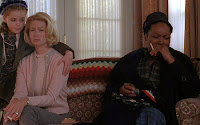 smoked. I never even played a character that smokes. I was totally all thumbs in the rehearsal trying to figure it out. At one point they just said “Okay, forget the cigarette,” but I knew that it was a moment that I could take advantage of to make Carla look more real. So I said, “No, no. I can do it.” So I worked on it and it worked. I had a couple of people who called me and said they loved that moment.
smoked. I never even played a character that smokes. I was totally all thumbs in the rehearsal trying to figure it out. At one point they just said “Okay, forget the cigarette,” but I knew that it was a moment that I could take advantage of to make Carla look more real. So I said, “No, no. I can do it.” So I worked on it and it worked. I had a couple of people who called me and said they loved that moment.
That comes from a personal experience. My mother talked about when Kennedy died and how affected my family, my father, people and friends at church. I mean, we loved him. People were saying to me in my own family how hard they took it and how they cried. We shared the grief that the rest of the country shared.
Wasn’t Kennedy in a lot of ways, to coin a phrase, the great white hope at the time, for a lot of African-Americans?
Exactly. We thought that he was sympathetic to civil rights. He was the first president to come along and care and say to the world that equality is important; segregation is evil. So that dialogue opened up with him. And that was true of all the Kennedys. Even Ted Kennedy, I loved how he spoke of equality.
I remember Ted, before he passed away, there was an interview where he talked about one of his sons asked him why he left money on the counter in the bathroom when they were leaving. And he said “Well, there’s someone who’s going to come in here and clean up after us and that person has a family and deserves a decent wage.” I thought that was beautiful. To me, it gave me something to give Carla more dignity. Real moments like that to relate to real people. Even if they’re in the role of a servant, they’re human beings. They deserve your respect. So I keep that with me when I’m playing Carla.
How do you feel about how the show deals with the burgeoning civil rights 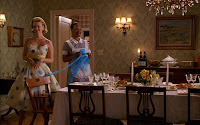 movement of the time? Because for the most part, it’s seen through the eyes of white characters.
movement of the time? Because for the most part, it’s seen through the eyes of white characters.
I’m hoping that if they stay true to the period, there’s no way they can’t bring that story to the forefront. I mean, that was the turning point for the country. This is ’63, this last season, so depending on when they decide to start next season, I don’t see how they can avoid civil rights.
There was a really nice scene with the elevator operator and Peter from the ad agency and he was trying to get advice from him about the television he uses. Even a simple scene like that showed so much. And then when he went to the client and tried to get them to open up to this whole other market and the client said “Is that legal?” I mean that’s how stupid people were about that kind of thing. I really appreciate how Matt Weiner manages to put in those kinds of scenes, that kind of dialogue. It is their point of view but it’s showing that it’s not always the right point of view.
Aside from talking to your mother, what kind of research did you do for this role?
I went to the library a lot of times and looked through old magazines, read the articles. And like I said, I have five older sisters. Very attractive and very educated women; I have two attorneys in my family, I have a brother who is a director of finance. I have very successful, educated people in my family and they all grew up during the ‘60s. And they knew that they were going to be better than what was being offered to them. A lot of this is where I come from. I come from a very proud people and hopefully I’m making them proud. That’s who Carla is. I’ve given her the type of history that my family comes from. We’re definitely people who were out there marching with Martin Luther King. We’ve always believed in human rights and civil rights and all that. So I looked through their yearbooks and try to relive their lives and experiences. It really is a feeling of reliving history.
Another of our favorite scenes is the one where Carla was listening to Dr. King on the radio and Betty walked in and she turned it off. It was very powerful because Carla didn’t feel like she could even listen to this in front of her employer.
Well, it was no longer her private time. This was what I mean about respecting the space. My mother gave me tips about that. She said she always knew where the line was that she couldn’t cross. 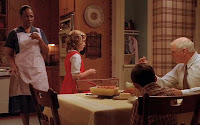 She said she was friends with Bob Denver’s wife but she always knew that she worked for her. She always knew that she couldn’t get too close unless she was invited. Like that scene you were talking about when Carla tried to offer advice to Betty and realized she’d gone over that line and walked away and said “I’m sorry,” that was exactly what my mother said had happened with her. There was a time when Bob’s wife was talking about something to her and my mother started offering her thoughts and Bob’s wife immediately acted like she didn’t want to hear her talking to her that way. My mother said she just backed up and said “I’m sorry.” Because that’s the thing; I’m very conscious of not making them uncomfortable around me.
She said she was friends with Bob Denver’s wife but she always knew that she worked for her. She always knew that she couldn’t get too close unless she was invited. Like that scene you were talking about when Carla tried to offer advice to Betty and realized she’d gone over that line and walked away and said “I’m sorry,” that was exactly what my mother said had happened with her. There was a time when Bob’s wife was talking about something to her and my mother started offering her thoughts and Bob’s wife immediately acted like she didn’t want to hear her talking to her that way. My mother said she just backed up and said “I’m sorry.” Because that’s the thing; I’m very conscious of not making them uncomfortable around me.
It certainly sounds like you have Carla completely fleshed out in your head and that’s part of what makes her so compelling to the audience.
Thank you. Yeah, I do. And one of the best parts is when Matthew said to me last season that he loved what I was doing even when I’m not talking.
Well, Carla definitely doesn’t get enough lines.
[Laughs] I know! But there still has to be a presence there. That comes from my training as an actor. I’ve had some really good training and great acting coaches in my career. There’s always an inner dialogue going on with the character so that her presence is felt.
You know that scene where the women during the fundraiser were talking about segregation? Carla goes to answer the door and she brings in the woman from the governor’s office and there were two women there talking about the south and one woman says something like, “My 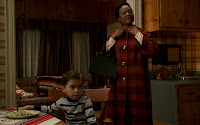 husband says they’re not living in 1963; they’re living in 1863,” and laughs. And Carla walks up right at that moment. I deliberately timed that so the audience can see that these were the kinds of conversations that were happening in our presence and we just had to keep working. That’s what I mean when I talk about having a presence.
husband says they’re not living in 1963; they’re living in 1863,” and laughs. And Carla walks up right at that moment. I deliberately timed that so the audience can see that these were the kinds of conversations that were happening in our presence and we just had to keep working. That’s what I mean when I talk about having a presence.
When the strike happened when all the maids stopped working during the bus strike, when Martin Luther King called for that, I mean that was a powerful time in history. And it showed the dignity that these people really did have. When they had a chance to speak up, they did. I’m very proud of that part of my history. My own mother was a part of that history. And I love my mother. I think she’s one of the proudest people I know. And she’s given dignity and pride in my life.
And I’m very proud of Matt because he’s never asked me to do anything that I would feel uncomfortable about and he’s always told me that he’s very happy with what I’m doing; he’s never told me I’m going in the wrong direction with her or anything like that. Just the opposite, in fact. This season he told me that he didn’t even realize what a good actress I was when he hired me. I appreciated that.
Do you think Carla has any anger?
Oh, yeah. Of course. Of course she does. How can she not have anger in this period? Anger for the situation and feeling less than other people. I’m sure she goes home and has somebody to vent to, 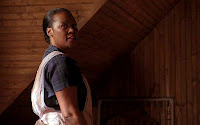 absolutely. I think that’s where a lot of my presence, when I need to be strong, comes from; being able to get angry.
absolutely. I think that’s where a lot of my presence, when I need to be strong, comes from; being able to get angry.
Carla had a great moment with Betty’s father when he mistook her for his maid and she snapped at him to the effect of “We’re not all the same.” That was a moment where we got to see just a little of Carla’s anger.
Exactly. And the fact that she assumed that he was thinking she stole the money in that episode.
Is there ever a moment where playing Carla really weighs on you and you go home and feel a little down about it?
Yeah, there is. I’ve actually cried, like the day we shot the scene where she was listening to Martin Luther King’s sermon for the girls in Birmingham. I mean, we were listening to the actual sermon. It’s really difficult for me to hear that this type of thing was going on and not feel a lot of pain about it. I definitely felt heavy and I felt sorry for my people, sorry that we had to go through this. And then you feel grateful that people went through it for you. Because I never experienced it the way that they did. So the struggle that they had to go through gained all the rights that I have today and I don’t take it for granted.
I’m grateful for the people who came before me. I draw on that strength. And I want Carla to have that strength to be able to endure. I think she knows there’s a better future. I hope people can see more than just a maid when they see Carla. That was definitely in the forefront for me when I took this job. I hoped that I could do something with this job that hadn’t been done; to give a woman in this role a real dignity and not be stereotypical in any way. I’m very conscious of not making her a “Yes, ma’am” type of person. Of course women like that existed but I think we’ve seen enough of that side of it.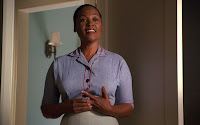
Well, we definitely think you’ve succeeded in making her a fully rounded character because whenever we read about the show – and we read about it A LOT – it seems to us that many writers go out of their way to point out how important you are in your scenes.
Well, I need to read some of these writers!
We just want to thank you for the interview and we hope that Betty takes Carla along to her new marriage next season.
I hope so too! Thank you so much.
Darlings, in more Mad Men news, we will be sitting in and chatting about all things Mad Men on Live From the Left Coast on San Francisco’s Green 960 from 6:00 to 8:00 (Pacific) TONIGHT along with Mad Men costume designer Janie Bryant and writer Maria Jacqemetton. And you don’t have to be in San Francisco to listen in! You just have to go here.
[Screencaps: tomandlorenzo.com]
Glee Season 1 Episode 10: Ballad Next Post:
Glee Season 1 Episode 11: Hairography
Please review our Community Guidelines before posting a comment. Thank you!

